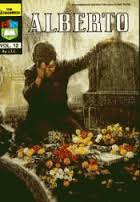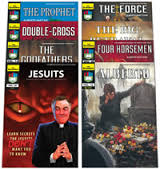Everybody Seems to Have a Jack Chick Story. Here’s Mine.
 Jack Chick, the anti-Catholic evangelist/comic-book artist provocateur, has passed away. He was 92.
Jack Chick, the anti-Catholic evangelist/comic-book artist provocateur, has passed away. He was 92.
My First Encounter with Chick Comics
I was raised in a mainline Protestant church in New York City. I had been bullied a lot in my early school years, but things began to turn around the week before I had entered high school. I had found Christ.
My first two years of faith I had kept my newfound reality rather dormant. I was still new to faith. But I got inspired after going to an intensive Christian summer camp to take calculated risks in being more open in sharing my faith. So, in my junior and senior years of high school, I began to be more bold. I began wearing Christian apparel. More importantly, I began to take a greater interest in the larger Christian subculture that my Episcopal parish was conversant in. I began to frequent Christian bookstores. I got into Christian Contemporary Music. I began attending my high school’s Bible Study (yes, a real club), with greater frequency.
When I had become a senior, I was elected president of that Bible Study. And in my fervor, I began to make changes. I added a “library” in our club, so students could both donate their books so others could grow from them. It was only about a couple of dozen materials, but I was happy other students were participating.
And it was in the context of this library that somebody had donated a Jack Chick comic book. It was about Fr. Alberto Rivera, a Jesuit priest who had left Catholicism and embraced “true Christianity.” And he had a ton of secrets to share that the Vatican did not want true believers to know about.
 Alberto Rivera Tells It All
Alberto Rivera Tells It All
I read these stories. And I was outraged about the sinfulness of the Catholic Church. I had accepted the claims of this book outright, solely because the writer had a “Sinner’s Prayer” in the back, and was leading people to Jesus.
Needless to say, the high school Bible Study that I had presided over had no Catholic participation. Perhaps we scared them away. Or perhaps most Catholic high schoolers at the time were ambivalent about their faith–which, for us “true Christians,” constituted greater proof that the contents of this comic book were real.
My First Embrace with “True Christian” Catholics
The very next year, I had moved on to college, and had forgotten all about the sordid stories of Alberto Rivera. I became associated with a number of Christian groups on campus, but the one group that I found myself dedicated to the most was one which was associated with the Charismatic Renewal. And, unbeknownst to me, it was largely populated with on-fire, “true Christian” Roman Catholics.
When I had made this discovery, six months in (they did not emphasize their Catholic beliefs, but strove to be ecumenical), instead of raising objections, I was just thrilled that Catholics could be believers in Christ, despite the problems of what the Catholic Church posited.
A Staggering Discovery
A turning point happened when, a few years into my involvement with this group, that I had found myself going to my college’s library, and in my interest of all things Christian related, discovered they had a giant backlog of Christianity Today issues. Christianity Today is an evangelical magazine dedicated to news and thought, and it is extremely credible on these fronts. And I discovered something that floored me.
It turns out that Christianity Today investigative reporters had looked into the testimony of Fr. Alberto Rivera (whom I had briefly forgotten at this point), and provided significant proof that his story was fraudulent. (In writing this blog post, it turns out that Cornerstone magazine had come to the same conclusions).
These exposés were written in 1981. A full six years before I had been introduced to these for myself.
From Wikipedia:
Rivera had a ‘history of legal entanglements’ including fraud, credit card theft, and writing bad checks. Warrants had been issued for his arrest in New Jersey and Florida, and he was wanted by the Spanish police for ‘swindles and cheats’; while in the U.S. in 1967, he claimed to be collecting money for a Spanish college, which never received this money. The details of his claims changed: In 1964 he said he had left the Catholic Church in July 1952, but he later put the date at March 20, 1967; despite this, he was still promoting Catholicism in a newspaper interview of August that same year. Although supposedly placed in the sanatorium in 1965 and held there for three months, he gave the date of his release as September 1967, leaving a period of over a year unaccounted.The document exhibited by Rivera to prove his status as a Catholic priest was fraudulently obtained and the Catholic Church denies his claims of having been a Jesuit priest or a bishop. He had only one sister in London; she was not called Maria (her name was María Teresa), was not a nun, and did not live in a convent. In an employment form dated 1963 he claimed marriage to Carmen Lydia Torres, and the couple had two children in the U.S. when he was supposedly a celibate priest in Spain.
Which means that–even though credible investigative journalists had come to the same negative conclusion–that Christian retailers had continued selling these toxic materials regardless. And faithful individuals who did not have the luxury of knowing the results of this were being duped on a massive scale.
Jack Chick: Dynamic Evangelist, or, Fear-Mongering Profiteer?
 It means that Jack Chick, who could have exhibited integrity in his materials, dropped the writings of Mr. Rivera from his roster, pulled his errant comics out of circulation, and continued with his evangelization without skipping a beat, had instead opted to continue publication, denounce credible objective Evangelical journalists with being in cahoots with the Vatican, and continued to rake in the dollars from the sale of these resources.
It means that Jack Chick, who could have exhibited integrity in his materials, dropped the writings of Mr. Rivera from his roster, pulled his errant comics out of circulation, and continued with his evangelization without skipping a beat, had instead opted to continue publication, denounce credible objective Evangelical journalists with being in cahoots with the Vatican, and continued to rake in the dollars from the sale of these resources.
I had not wanted to be a Catholic. I had no desire to. But witnessing firsthand the corruption in the Christian publishing sphere and the complicity of Christian retailers… all because of an earnest zeal to get readers to participate in the “Sinners Prayer”–this marked a turning point for me.
It was no longer enough to simply recite a single prayer–no matter how earnest. It was no longer enough to stand idly, breaking the Commandment on bearing “false witness,” while still identifying yourself as a Christian. One needs to make a complete break from the charlatan, even at significant cost.
I had still not yet been convinced of the proofs for the doctrines of Catholicism at that point (except for Mary–but that is an altogether different story), but that moment of discovery marked a turning point for me in my openness towards Catholicism. It would only be another year before I had decided to enter RCIA, and almost two years before I had formally entered the Catholic Church.
Concluding Thoughts
So when Jack Chick had passed away this week, it should be noted that I had discovered that most of today’s Evangelical young adults have paid him no mind. Some were rightfully embarrassed by him. Some wanted to move away from his histrionic approaches to evangelism. The only embrace of Chick tracts were of an ironic bent, a morbid fascination of the lengths one man went through to pass on the faith, yet unchecked by the larger Christian body.
But it’s articles like this one (How Jack Chick Ironically Brought Me to the Catholic Church) that I found that I was most relating to… Catholic converts expressing that, had they not encountered Jack Chick’s literature, they would not have embraced Catholicism. It’s not what he would have wanted, but sometimes God writes with crooked lines.
What are your thoughts on Jack Chick and Alberto Rivera? Share in the Comments below.
I am currently creating a new product to serve entrepreneurs. If you want to promote your website, please fill out this 3 minute survey. We need your help!!








